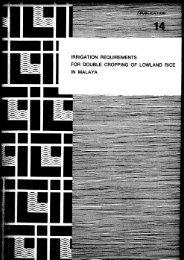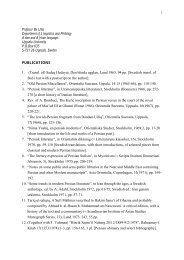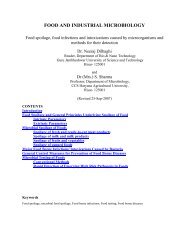On the Future of Indigenous Traditions - Munin
On the Future of Indigenous Traditions - Munin
On the Future of Indigenous Traditions - Munin
Create successful ePaper yourself
Turn your PDF publications into a flip-book with our unique Google optimized e-Paper software.
traditional customary system prove its worth for <strong>the</strong> Adivasis <strong>the</strong>mselves as well as<br />
<strong>the</strong> non-Adivasi?<br />
Sidsel Saugestad raises <strong>the</strong> question <strong>of</strong> indigenous peoples in her essay 147 on Africa’s<br />
<strong>Indigenous</strong> Peoples: First Peoples’ or ‘Marginalised Minorities’ is <strong>the</strong> similar issue<br />
for <strong>the</strong> Adivasis when it comes to accepting <strong>the</strong>m as indigenous, who only have <strong>the</strong>ir<br />
place as ‘Scheduled Tribes’ and <strong>the</strong>ir privileges cut whenever <strong>the</strong> government wants<br />
to.<br />
Coming back to <strong>the</strong> original question: how do <strong>the</strong> Adivasi, Aboriginal, <strong>the</strong> First<br />
Nation, <strong>the</strong> ‘historical communities’ and <strong>the</strong> like, when denied <strong>the</strong>ir status as<br />
indigenous by <strong>the</strong> individualistic natured institutions, challenge <strong>the</strong> modern nationstate<br />
and its governments? What would be <strong>the</strong> most important step for <strong>the</strong> indigenous<br />
people?<br />
Firstly, for <strong>the</strong> indigenous peoples, it is <strong>the</strong> realisation <strong>of</strong> <strong>the</strong>ir rich social and cultural<br />
components exist within an indigenous shared philosophy is <strong>the</strong> first step to assertion<br />
<strong>of</strong> <strong>the</strong>ir rights to <strong>the</strong> State that do not regard <strong>the</strong> collective approach in <strong>the</strong> broader<br />
frame <strong>of</strong> rights.<br />
Second step would be to take up case studies <strong>of</strong> o<strong>the</strong>r indigenous groups in post<br />
colonial States to compare if <strong>the</strong> new states recognise <strong>the</strong> indigenous peoples<br />
collective aspects through comparative studies.<br />
Finally, to say that <strong>the</strong> customary systems <strong>of</strong> <strong>the</strong> indigenous peoples, not necessary<br />
that all have only good aspects in it, <strong>the</strong>se aspects toge<strong>the</strong>r however need to be<br />
studied. It is by taking a constructivist approach <strong>the</strong>se systems could reveal that <strong>the</strong>re<br />
is ano<strong>the</strong>r aspect in <strong>the</strong> discourse <strong>of</strong> political philosophy which has not been explored;<br />
<strong>the</strong> geo-cultural politics. However, some thing that is its basis <strong>of</strong> it all to put it up ones<br />
again as Gregory Bahla had stressed:<br />
147 Sidsel Saugestad, “Contested Image: ‘First Peoples’ or ‘Marginalised Minorities’ in Africa?” In<br />
Africa’s <strong>Indigenous</strong> Peoples: First Peoples’ or ‘Marginalised Minorities’? Edited by Barnard, A. and J.<br />
Kenrick (Edinburg: University <strong>of</strong> Edinburg, 2001), 299-322.<br />
105

















